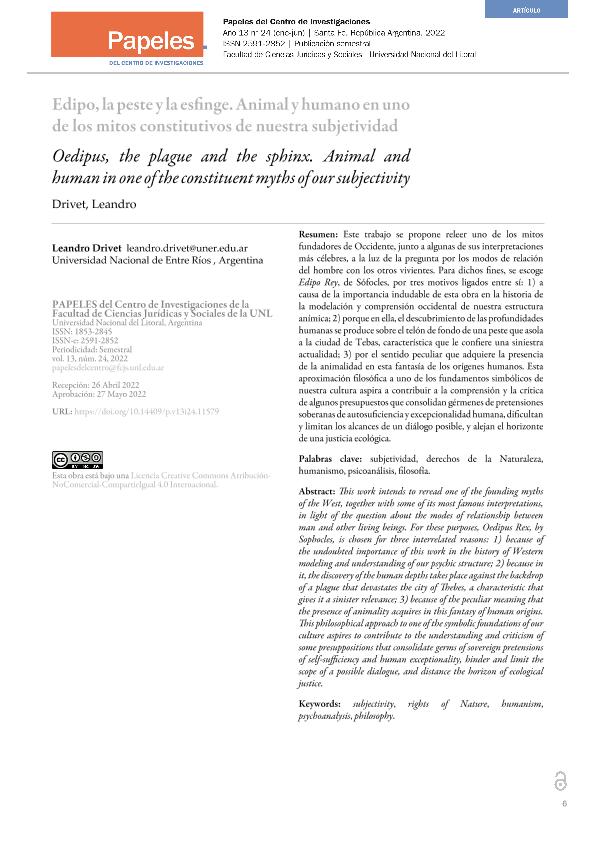Artículo
Este trabajo se propone releer uno de los mitosfundadores de Occidente, junto a algunas de sus interpretacionesmás célebres, a la luz de la pregunta por los modos de relacióndel hombre con los otros vivientes. Para dichos fines, se escogeEdipo Rey, de Sófocles, por tres motivos ligados entre sí: 1) acausa de la importancia indudable de esta obra en la historia dela modelación y comprensión occidental de nuestra estructuraanímica; 2) porque en ella, el descubrimiento de las profundidadeshumanas se produce sobre el telón de fondo de una peste que asolaa la ciudad de Tebas, característica que le confiere una siniestraactualidad; 3) por el sentido peculiar que adquiere la presenciade la animalidad en esta fantasía de los orígenes humanos. Estaaproximación filosófica a uno de los fundamentos simbólicos denuestra cultura aspira a contribuir a la comprensión y la críticade algunos presupuestos que consolidan gérmenes de pretensionessoberanas de autosuficiencia y excepcionalidad humana, dificultany limitan los alcances de un diálogo posible, y alejan el horizontede una justicia ecológica. This work intends to reread one of the founding myths of the West, together with some of its most famous interpretations, in light of the question about the modes of relationship between man and other living beings. For these purposes, Oedipus Rex, by Sophocles, is chosen for three interrelated reasons: 1) because of the undoubted importance of this work in the history of Western modeling and understanding of our psychic structure; 2) because in it, the discovery of the human depths takes place against the backdrop of a plague that devastates the city of Thebes, a characteristic that gives it a sinister relevance; 3) because of the peculiar meaning that the presence of animality acquires in this fantasy of human origins. This philosophical approach to one of the symbolic foundations of our culture aspires to contribute to the understanding and criticism of some presuppositions that consolidate germs of sovereign pretensions of self-sufficiency and human exceptionality, hinder and limit the scope of a possible dialogue, and distance the horizon of ecological justice.
Edipo, la peste y la esfinge: Animal y humano en uno de los mitos constitutivos de nuestra subjetividad
Título:
Oedipus, the plague and the sphinx: Animal and human in one of the constituent myths of our subjectivity
Fecha de publicación:
06/2022
Editorial:
Universidad Nacional del Litoral
Revista:
Papeles
ISSN:
1853-2845
e-ISSN:
2591-2852
Idioma:
Español
Tipo de recurso:
Artículo publicado
Clasificación temática:
Resumen
Palabras clave:
SUBJETIVIDAD
,
DERECHOS DE LA NATURALEZA
,
HUMANISMO
,
PSICOANÁLISIS
Archivos asociados
Licencia
Identificadores
Colecciones
Articulos(SEDE CENTRAL)
Articulos de SEDE CENTRAL
Articulos de SEDE CENTRAL
Citación
Drivet, Leandro; Edipo, la peste y la esfinge: Animal y humano en uno de los mitos constitutivos de nuestra subjetividad; Universidad Nacional del Litoral; Papeles; 13; 24; 6-2022; 6-14
Compartir




